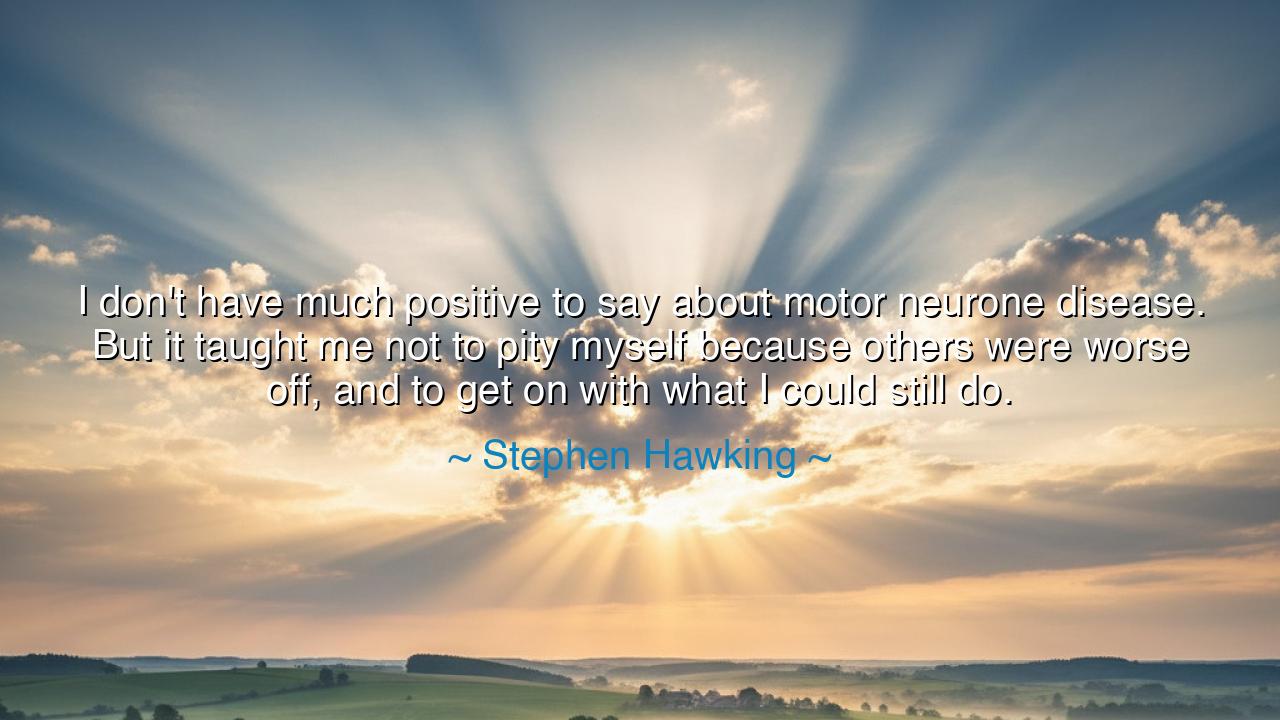
I don't have much positive to say about motor neurone disease.
I don't have much positive to say about motor neurone disease. But it taught me not to pity myself because others were worse off, and to get on with what I could still do.






When Stephen Hawking declared, “I don't have much positive to say about motor neurone disease. But it taught me not to pity myself because others were worse off, and to get on with what I could still do,” he revealed a truth born not of comfort, but of struggle. His words are forged from the fire of suffering, yet they shine with the clarity of wisdom: that hardship need not reduce a man to despair. Instead, it can strip away self-pity and awaken the courage to embrace what remains. In this, we see not only the mind of a great scientist, but the spirit of a warrior who refused to yield to his fate.
The ancients would have recognized this lesson. The Stoics, men like Seneca and Epictetus, taught that while the body may be broken or chained, the mind remains free. Epictetus himself was born a slave and crippled by cruelty, yet he declared that no misfortune could master his soul unless he allowed it. Hawking’s wisdom flows from this same stream: though his body weakened under the weight of disease, he chose to focus not on what was lost, but on what could still be done.
History, too, provides luminous examples. Consider Franklin D. Roosevelt, struck by polio in his prime, confined to a wheelchair. He could have surrendered to despair, retreating from the public stage. Instead, he pressed forward, leading his nation through the Great Depression and World War II. Like Hawking, he refused to pity himself, choosing instead to harness his remaining strength for the good of others. His resilience turned personal tragedy into a foundation for global leadership.
Hawking’s words also remind us of the danger of self-pity. To wallow in sorrow is to chain the spirit twice: once by misfortune, and again by despair. He teaches us that others suffer as well, often with burdens heavier than our own. This recognition, far from diminishing our pain, transforms it into perspective. It awakens gratitude for what remains and humility toward the struggles of others. In this way, adversity can refine the soul, stripping it of bitterness and filling it with strength.
At the heart of his teaching lies the power of action. Hawking did not dwell endlessly on what disease had stolen from him. Instead, he asked: What can I still do? With that question, he unlocked the energy to continue his work, producing groundbreaking theories that reshaped our understanding of the universe. His life is proof that greatness does not require perfect health or unbroken circumstances — it requires the will to act with what one has, here and now.
The lesson is clear: when misfortune strikes, resist the temptation to sink into despair. Do not measure your life by what has been taken, but by what you can still give. Look beyond your own suffering, and you will see others carrying burdens heavier than your own. This awareness will free you from pity and awaken the strength to continue your journey.
In practice, this means cultivating resilience in daily life. When you encounter hardship, pause to acknowledge it, but do not let it define you. Ask instead: What remains within my grasp? What good can I still do with what I have? Turn your eyes outward — to service, to creation, to compassion — and your suffering will no longer consume you. It will become the soil from which courage grows.
Therefore, let us carry Stephen Hawking’s wisdom: even in the face of disease and loss, do not pity yourself. Focus on what you can still do, and do it with all your strength. In this lies true resilience, the kind that transforms tragedy into triumph and leaves a legacy of light for generations to come.






TTPhung tuan thinh
Hawking’s insight is powerful but also complex. It makes me question the balance between acknowledging suffering and refusing self-pity. How did he reconcile frustration or fear with a focus on what he could still do? I’m also intrigued by the social implications—does emphasizing personal capability risk overlooking the need for support systems or advocacy for people with severe disabilities? It seems like his perspective combines personal responsibility with a broader philosophical approach to life’s limitations.
MMai
This statement made me reflect on the value of focusing on capabilities rather than limitations. I’m curious about the practical strategies Hawking might have used to maintain productivity and creativity despite his disease. It also raises philosophical questions: can comparing oneself to others in worse situations ever be helpful, or does it distract from meaningful action? I wonder how his attitude influenced those around him and whether it inspired others to adopt a similar mindset of resilience.
NHNgoc Huyen
Reading this, I feel a mix of admiration and reflection. Hawking’s perspective highlights the importance of agency and perspective in coping with illness. I wonder if there were moments he struggled with self-pity and how he overcame them. Does this approach risk minimizing the real pain and challenges people face, or does it serve as a motivational framework? It also prompts questions about how society supports individuals in focusing on what they can achieve rather than their limitations.
ATNguyen Thi Anh Thu
This quote strikes me as both humbling and inspiring. It makes me wonder how Hawking developed the resilience to focus on what he could still achieve despite immense physical limitations. I’m curious about whether this mindset was innate or cultivated over time. Additionally, it raises questions about how we define strength in the face of adversity—can focusing on action rather than comparison to others be a model for dealing with challenges in everyday life?